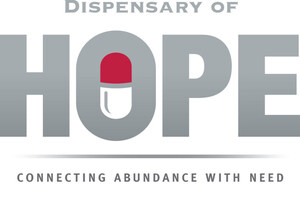
Researchers from Dispensary of Hope have identified "Charitable Medication Deserts" where Americans lack access to affordable medications
NASHVILLE, Tenn., April 23, 2025 /PRNewswire/ -- A groundbreaking new study from researchers at Dispensary of Hope, a subsidiary of Ascension, has identified significant gaps in access to charitable medication providers across the United States, leveraging multiple data sources to pinpoint geographic areas facing substantial barriers to obtaining affordable medications.
Dispensary of Hope, a nonprofit organization that distributes critical medications to pharmacies and safety-net clinics across the nation for the benefit of low-income, uninsured patients, collaborated with Belmont University College of Pharmacy and Health Sciences to develop a novel "Charitable Medication Desert Index" (CMDI) that identifies areas with the greatest need for charitable medication services.
The study was conducted by Mary Lankford, PharmD, CAHIMS from Dispensary of Hope, Peaches Brown, PharmD Candidate Class of 2025 from Belmont University College of Pharmacy and Health Sciences, and Hillary Blackburn, PharmD, MBA from Dispensary of Hope/Ascension Rx.
"This research revealed alarming gaps in medication access, particularly in specific geographic hotspots," said Scott Cornwell, CEO, Dispensary of Hope. "By identifying these medication deserts, we're taking a crucial step toward helping to ensure that everyone has access to the medications they need, regardless of their financial circumstances."
The study utilized multiple data sources, including Census 2023 ACS data, Dispensary of Hope records, HRSA information, state pharmacy licensing databases, and other resources to create a comprehensive mapping of charitable medication providers and uninsured populations. Researchers developed the CMDI to classify counties and ZIP codes based on uninsured rates, medication access, and coverage gaps.
The study identified critical need areas in both rural and urban settings. Rural areas included places like Millersburg, Ohio, where uninsured residents must travel nearly 17 miles to the nearest charitable medication provider, and Laredo, Texas, where the coverage gap includes over 22,000 uninsured individuals. Urban areas face similar challenges—particularly in Texas, home to all of the top 10 critical need urban ZIP codes. In the Houston area, for example, the study found a coverage gap of over 38,500 uninsured residents despite the presence of multiple charitable providers nearby.
"Each charitable medication provider can serve approximately one thousand patients, but our study found numerous areas where those in need far exceeds available capacity," said Mary Lankford. "The data strongly suggests that expanding charitable medication networks in these identified areas could reduce healthcare disparities and improve outcomes, as measured by key metrics such as hospitalizations and emergency department visits."
"While charitable pharmacies are critical to reduce healthcare disparities, their potential is limited by funding constraints and the absence of a public registry," Lankford added. "Our hope is that with significant improvements to data infrastructure and expanded support for charitable medication providers, we'll see the closure of coverage gaps over time."
The new study builds on previous research showing that access to affordable medications improves health outcomes and decreases hospitalizations for vulnerable populations, ultimately improving patient lives.
"This study is about something very real: people doing their best to stay healthy while facing impossible choices—like whether to pay for food or their medication," said Eduardo Conrado, President of Ascension. "Research like this reminds us why our Mission matters. When we make medications accessible to those who can't afford them, we are not just improving health outcomes—we are helping people stay on their feet, keep their jobs, care for their families, and live with dignity. This work affirms the need to expand charitable medication services wherever the need is greatest."
The research was presented at the American Pharmacists Association Annual Meeting in Nashville, March 21–24, 2025.
About Dispensary of Hope
Dispensary of Hope is a nonprofit medication distributor based in Nashville and a subsidiary of Ascension. It brings together pharmaceutical manufacturers and safety-net health care providers to help people in need. The program provides free medication to eligible patients who are low-income and uninsured. Dispensary of Hope connects different parts of the health care system in a unique way. The organization is licensed to distribute medication in all 50 states and follows the highest standards for safety and quality in every step of the process. This work leads to better health for patients, lower costs for providers, and less waste for the environment. To learn more, visit www.dispensaryofhope.org.
About Ascension
Ascension is one of the nation's leading non-profit and Catholic health systems, with a Mission of delivering compassionate, personalized care to all with special attention to those most vulnerable. In FY2024, Ascension provided $2.1 billion in care of persons living in poverty and other community benefit programs. Across 16 states and the District of Columbia, Ascension's network encompasses approximately 106,000 associates, 26,000 aligned providers, 105 wholly owned or consolidated hospitals, and 34 senior living facilities. Additionally, through strategic partnerships, Ascension holds an ownership interest in 26 other hospitals. For more information, visit www.ascension.org.
SOURCE Dispensary of Hope







Share this article